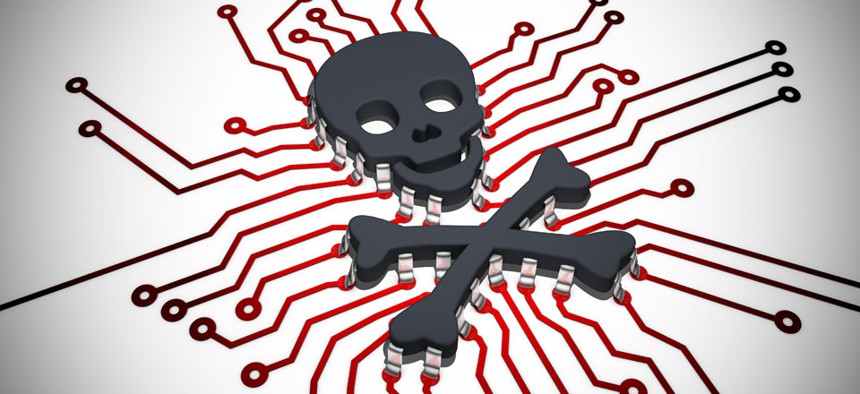The Number of Industries Getting Classified Cyberthreat Tips from DHS Has Doubled Since July

Finchen/Shutterstock.com
The banking, chemical, water, information technology and transportation sectors all recently joined.
Firms from half of the nation’s 16 key industries, including wastewater and banking, have paid for special technology to join a Department of Homeland Security program that shares classified cyberthreat intelligence, in hopes of protecting society from a catastrophic cyberattack.
Participation in the Enhanced Cybersecurity Services initiative has more than doubled during the past few months.
Through the voluntary program – previously exclusive to defense contractors – cleared Internet service providers feed nonpublic government information about threats into the anti-malware systems of critical sector networks.
As of July, only three industries – energy, communications and defense – were using the service, according to an unfavorable DHS inspector general audit.
Now, befitting National Cybersecurity Awareness Month, Homeland Security officials say the financial, water, chemical, information technology and transportation sectors also are receiving the threat indicators. Just two months ago, American Chemistry Council officials said they had never heard of the program. The service has been available since 2013.
DHS Makes Program a Priority
“DHS continues to work closely with our public and private sector partners in expanding the Enhanced Cybersecurity Services program to all critical infrastructure sectors that operate the systems we all rely on," DHS spokesman S.Y. Lee said in an email. "Information sharing is a key part of the Department of Homeland Security’s important mission to create shared situational awareness of malicious cyber activity.”
The sense is that Andy Ozment, assistant secretary for the DHS Office of Cybersecurity and Communications, who took office in April, has made the program a priority.
“Now that he’s had a few months to get settled, you’re seeing some fruits of labor from his team,” said Dan Waddell, director of U.S. government affairs for (ISC)2, a security industry association.
In May, DHS also deployed automation that “is making the data sharing process much more efficient, so as the word spreads, folks are more likely to join now versus when it was a manual process,” he added.
After Congress failed to pass cybersecurity reforms, President Barack Obama in February 2013 took regulatory action to defend critical infrastructure systems against attackers.
Obama issued an executive order to extend the intelligence-sharing program outside the defense sector and create separate, optional cybersecurity controls. The intelligence-sharing service works by blocking certain IP and email addresses, attachments and additional "signatures" of hacker campaigns that National Security Agency staff and other cyber analysts have discovered.
But the added protection comes with a price tag. Companies typically must cover the costs of new equipment and additional security professionals.
“This is not a trivial exercise and requires a significant investment in people, process and technology on the part of the” ISP or critical infrastructure company, Waddell said.
Even though only half of the industries deemed critical by the government have joined, there's no cause for concern yet, he said.
“Representation by all 16 of the critical infrastructure sectors would be a major milestone and something that DHS should target in 2015,” Waddell said, adding that as the information exchange grows it will likely attract more firms.
Wider Growth Could Depend on Congress
Information-sharing programs, in general, might not take off until Congress passes liability protections and customer privacy measures, other cyber experts have said.
DHS officials, acknowledging these concerns, say the Enhanced Cyber Services program protects civil liberties and is not mandatory.
Some former top administration officials argue government should force businesses to be forthcoming to contain disasters.
"I think they ought to be compelled to share the information because it’s a threat, really, to the entire nation," former Attorney General Michael Mukasey told reporters last week. "If someone can take down a power grid, I want a power company telling me that."
However, Mukasey, who served in the Bush administration and now represents private industry as a partner at Debevoise & Plimpton, said companies who admit sensitive data has been jeopardized should not be penalized.
"One of the things that’s going to happen, if they are a publicly held company, is that their stock price is going to suffer as a result, and sure as night follows day there are going to be lawsuits filed by lawyers who are going to claim that they should have known," he said. "So, somebody has got to provide protection if they have to share the information."
The advantages of the DHS intelligence program could be worth the risks in some instances, Ozment said recently.
“Our general philosophy is any information-sharing legislation has to be done in a way that it protects privacy and civil liberties, and if it offers liability protection, that has to be narrowly-targeted liability protection so that we don’t incentivize anything other than the exact behaviors we are trying to incentivize," he said at an October 9 panel on cybersecurity hosted by Bloomberg.
Even without broader information information-sharing legislation, Ozment said he’s focused on selling industries on the benefits of the concept.
“Rather than waiting for Congress, what I am doing is focusing on raising that potential upside,” he said. “Here are all the benefits you get from sharing information with the government and with each other.”
(Image via Finchen/Shutterstock.com)






